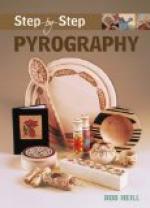He showed Gregory the formula. It was not very easy to understand, but it was impressive. Cockatrice eggs were to be placed carefully in a nest in a stone walled underground chamber, which must be sealed from the outer air when all was ready. Snakes and toads brooding thereon would in time hatch out baby monsters—creatures with cocks’ heads and the tails and wings of dragons. Their look was sure death, but they could be poisoned by a draught compounded of agrimony, dill and vervain. This must be prepared beforehand and left in a bason where the cockatrice when hatched would find and drink of it. When all were dead they were to be brayed in a mortar with other necessary ingredients. When the stars indicated that the fortunate hour was at hand, the compound was to be heated in a crucible over a large brazier, covered with a layer of chaff to absorb the poisonous gases that arose. That which remained in the crucible would be pure gold.
“’Tis a fearsome business,” said Padraig naively, “for men hate wizards.”
“Let them hate, if they fear us as well,” muttered Gregory poring over the mysterious phrases. Visions arose in his mind of a Grand Master whose power should have no limit, whom Kings must serve and Sultans fear. Nay, not only should the Holy Temple be recovered, but it should be built anew, overlaid with gold as in Solomon’s day. He called a steward and ordered him to fit up a cellar, formerly a passage into the vaults of the oldest part of the building, with all needful utensils. Braziers, crucibles, retorts and all the usual materials in the way of metals and powders were there, but of course, no cockatrice eggs.
“He brought these from Andalusia,” said Padraig, showing seven small eggs mottled with crimson and black in a medicine box. Gregory touched one very gingerly. They were in fact waxen shells filled with volatile liquids, and Padraig had spent most of the night preparing them. He explained that they were no larger than frogs’ eggs when he first had them,—which was perfectly true, the wax having been carried in the form of balls.
Sulphurous odors came from the cellar where the eggs were supposed to be hatching in their nest. An unwary hound sniffing about the door got a throatful of the stinging smoke and fled yowling. Hydrochloric acid, vitriol and nitre-glycerine are kittle things to meddle with, and the place was religiously avoided.
From the too free tongue of a cellarer one night Padraig learned that this chamber adjoined the treasure-vaults of the Temple, but the communicating door had been walled up. When the gold should be ready it could be conveyed into the treasury direct, by reopening this doorway.
One evening Prince John rode up to the gate with a company of Norman men-at-arms and a few courtiers. It was understood that he had come to investigate the reputed sorceries. On the same day three strangers came into the village and tarried at Swart’s house on Aschenrugge. He often lodged travelers for a night, being near the highway. Padraig, spying a white signal on the giant ash which gave the ridge its name, told the impatient Preceptor that the hour was at hand.




